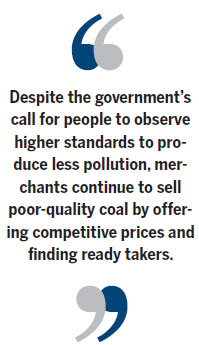Unofficial 'barriers' must be removed
Updated: 2015-12-18 09:19
By Ed Zhang(China Daily Europe)
|
|||||||||||
Investors need a clear map showing industries and provinces where they are welcome
It will take some time for the world to fully digest the significance of the interest rate hike in the United States, the first since 2006.
But one immediate consequence for China looks almost certain: A higher interest rate for the dollar, and the pull it will exert on money flows from other countries to the US, will probably decrease the financial resources available for emerging economies.
China's transition needs a lot of funding. Trial and error is a costly process, which will inevitably cause some financial loss, especially in an imbalanced economic structure built on a hefty state-owned sector whose enterprises do not possess next-generation technologies and are often riddled with corruption.
Of Internet-based business ventures, many are small and still heavily reliant on investors' money for experimenting with their business models - some becoming obsolete very quickly and unable to generate the expected returns, and others likely to require more investment to truly come into their own.

Toward the end of this year, there have been reports about the demise of an increasing number of Chinese venture companies. Next year, it is said, more Chinese venture capital will go across the Pacific Ocean, creating a further drain on the funding resources available for domestic innovation.
A difference can be made, of course, if only the government makes the domestic investment environment more dynamic and attractive, especially for direct investment in industries where investors are still blocked by many institutional barriers.
"Institutional barriers" is a term many economists like to use when they talk about Chinese reform. However, there are two types.
One is openly stated, such as the limitations listed on the government's negative list, which spells out business undertakings prohibited to private or foreign enterprise. There is no room for confusion here; even though such lists cannot include a great many items in a country that claims to be committed to the market economy.
The other type is much worse. They are the remnants of the old bureaucratic ways of running society, such as officials' habits and ways for providing public services, often in unhelpful ways.
One thing that often bothers local officials is whether making an industry fully accessible to private investment is proper - even though it is permitted. They still remember the old documents and old policies that forbid them from doing it, and find that approvals might be politically unacceptable.
And it's not only a memory problem. Hanging on to old habits is more often than not accompanied by a lack of new ways of doing things and disciplining reluctant officials.

One recent example is the inspection teams dispatched by the Ministry of Environmental Protection during the peak time of winter smog in northern China. Inspectors found that use of cheap but low-quality coal, especially for household heating, is rampant in rural areas in some provinces, the very victims of repeated attacks by hazardous smog waves.
Despite the government's call for people to observe higher standards to produce less pollution, merchants continue to sell poor-quality coal by offering competitive prices and finding ready takers.
Such instances are routine, but local officials, in environmental monitoring and from other public services such as urban utilities, housing development and public hygiene, also see it as none of their business. They don't see it as their obligation to intervene.
This illustrates the case that in order to remove institutional hurdles, what the central government has to do is not just issue policy papers but also devise as many ways as possible to make local officials work properly and punish those who don't.
For investors, the lesson is clear: It is important to read government policy papers as a guideline to look for new opportunities. But they also need a map, one showing the industries and provinces where there are no longer strong institutional barriers, particularly those of the second type.
Will the officials reported by the Ministry of Environmental Protection's inspection teams truly welcome investors in innovative businesses, such as in clean-energy solutions? It will take some time.
The author is editor-at-large of China Daily. Contact the writer at edzhang@chinadaily.com.cn.
(China Daily European Weekly 12/18/2015 page12)
Today's Top News
Xi calls for shared future in cyberspace
China successfully launches its first dark matter satellite
China becomes shareholder in European bank
Jeb Bush calls Trump a 'chaos candidate'
French report stresses China's growth offers new opportunities
Reasonable economomic growth rate targeted
French far-right fails to win any regions
Obama says anti-IS fight continues to be difficult
Hot Topics
Lunar probe , China growth forecasts, Emission rules get tougher, China seen through 'colored lens', International board,
Editor's Picks

|

|

|

|

|

|






